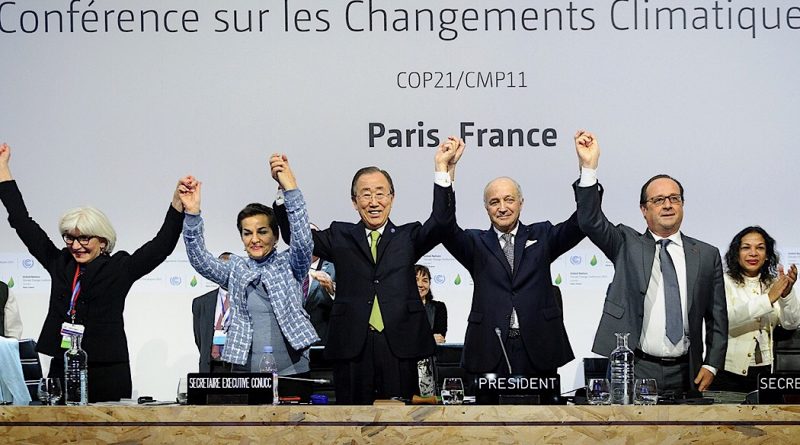University of Dayton States #WeAreStillIn
By: Julia Hall – Print Editor
On Wednesday, University of Dayton President Eric Spina digitally signed a document declaring that the university will continue to work towards the goals set within the Paris Agreement, including dedication to reducing carbon emissions.
This statement, #wearestillin, was made in conjunction with over 200 higher education institutions and nearly 1000 other businesses, states and cities in reaction to President Donald Trump’s withdrawal of the United States from the Paris Climate Agreement on June 1.
After Trump officially began the process of withdrawing the U.S. from the Paris Agreement (this process will take nearly four years and may be finalized the day after the 2020 presidential election), Spina considered signing this document, “We Are Still In,” and shared his thoughts with the vice presidents and others.
Six days later, Spina officially signed.
Related: Environmentalists collaborate for Earth Fest
“We had been monitoring the concern about some of the proposals in the original skinny budget in terms of the EPA, obviously. Some of the appointments have been people who don’t believe in climate change or kind of dismiss it as relative to other concerns,” Spina stated in an interview with Flyer News.
“We have been tracking very carefully, working with other organizations: Association Catholic Colleges and Universities, Marian Council of Education and the alphabet soup of higher ed agencies.”
Spina also referred to the Marianist charism of social justice and the upholding of the dignity of every person.
Further, he pointed to the Pope’s teachings, emphasizing that, “it is the most marginalized, poorest populations who will be affected by climate change.”
“I am hopeful. Higher ed, I think, is the best place to be right now because we get opportunities to work with students who are a heck of lot wiser and worldly than I was when I was in college. I think a lot of you are already seizing the mantle of leadership to make a change, and we really need to rely on you to hopefully to have a less cynical form of government, really body politic, in our country,” Spina stated.
Another member of the UD community, Dr. Robert Brecha, professor of physics and coordinator of the SEE (Sustainability, Energy and the Environment) Minor, was also vocal in response to the U.S. departure.
On Friday, days prior to UD making a formal statement, he wrote an article on the website of WYSO, a public radio station in the Miami Valley, titled, “Commentary: The U.S. and the Paris Agreement.”
The university has made it clear: they are persistent in their work for sustainable energy and communities- and are willing to be vocal.
Now, how does UD plan to not just talk the talk, but walk the walk?
Spina outlined three main areas on which UD will focus efforts to slow climate change: research, education of students, and operations of the university.
The “We Are Still In” document states, “Together, we will remain actively engaged in the international community as part of the global effort to hold warming to well below 2˚C and to accelerate the transition to a clean energy economy that will benefit our security, prosperity, and health.”
Related: Meet UD’s Newest President: Dr. Spina
Spina pointed to a handful of examples of things that have begun to take shape the over the last three to four months, including work related to food insecurity, solar energy, and the Hanley Sustainability Institute.
“We are now in a position where we think we are knowledgeable enough about solar that we are preparing to make some pretty significant strides in solar- that’s actually something a couple of faculty members and maybe a student were just involved in looking at some proposals for some places on campus where we would have our first solar, our first significant solar, display,” Spina commented.
Additionally, he stated that UD is “really close” to hiring a new Hanley Institute Director.
Spina stated, “As a country we may say we are out, but as organizations and institutions- again not commenting on the political aspects of the Paris Accord. We can have that debate, but from my perspective, these are the scientific facts. These are the people being harmed. This is the right thing for us to do as an institution.”
Photo Courtesy carbonbrief.org

